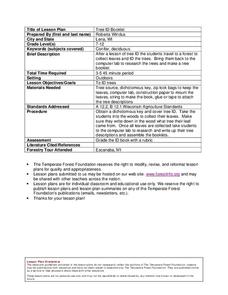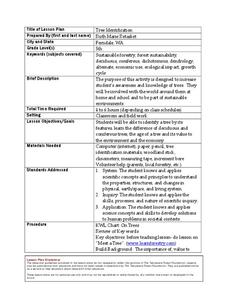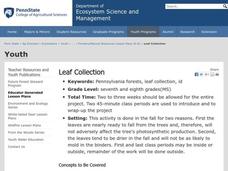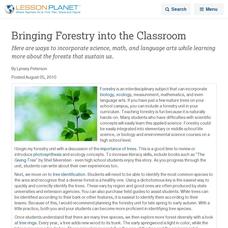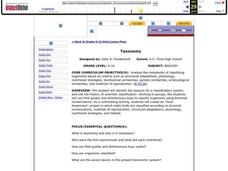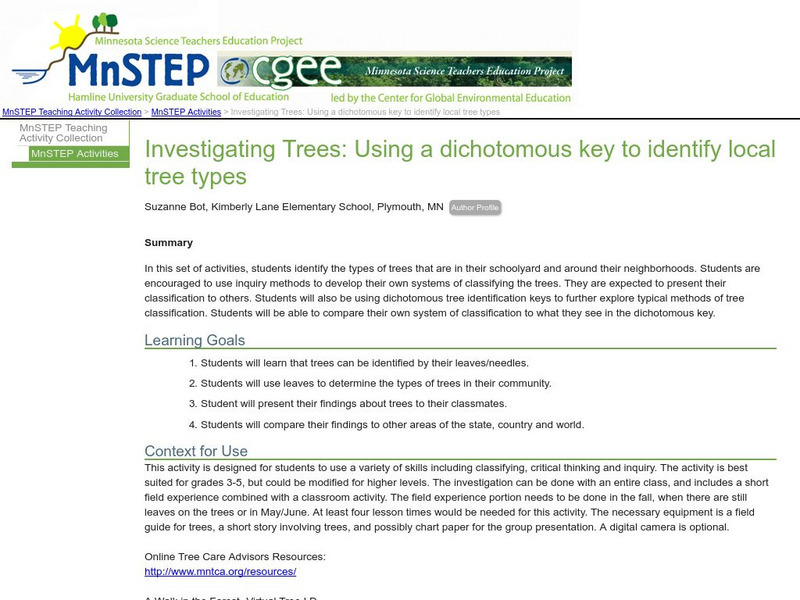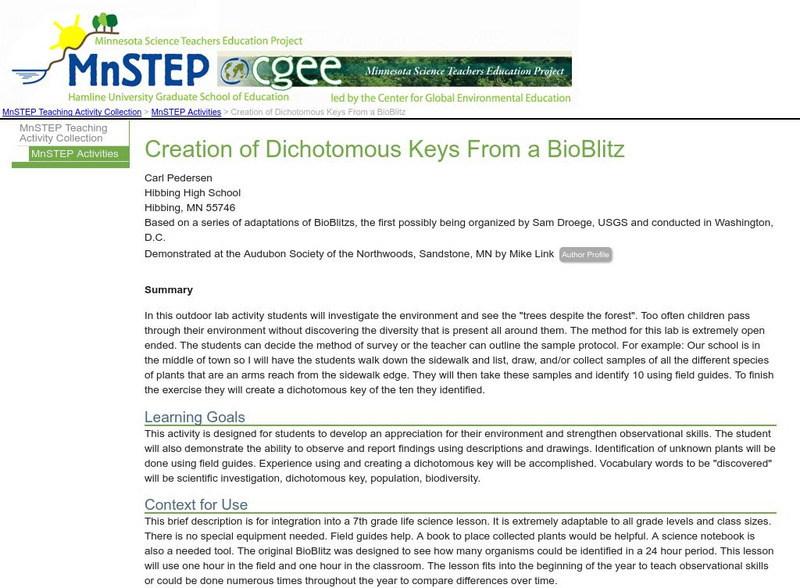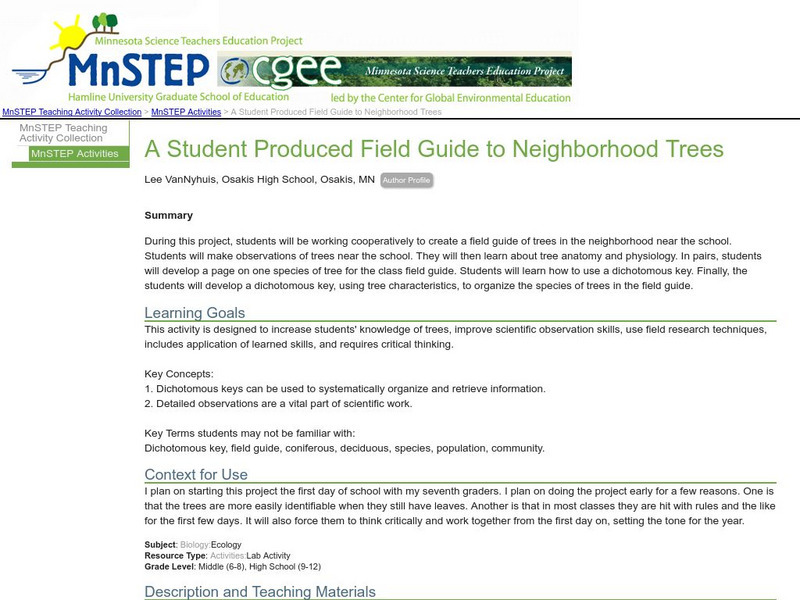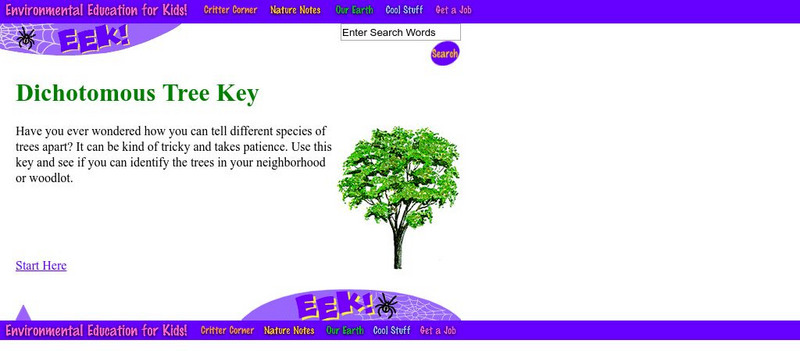Curated OER
Tree ID Booklet
Young scholars make a booklet of leaves they find and identify the tree they came from. In this tree identification lesson plan, students research the leaves on the internet to determine the tree they come from.
Curated OER
Identifying Wyoming Trees
Learners identify trees based from their leaves. In this leaf lesson plan, students use The Rocky Mountain Tree Finder by Tom Watts in order to identify tree leaves. They look for leaf shapes, veins, and structure.
Curated OER
Tree Identification
Students list four ways to identify trees. In this tree identification instructional activity, students use tree identification techniques such as leafs, bark, wood grain, soil type, and climate to create tables and graphs.
Curated OER
Tree Identification
Learners are introduced to the characteristics of trees and different techniques to identify them. They distinguish between a deciduous and a coniferous tree. Students describe at least four characteristics used to identify trees. They...
New South Wales Department of Education
Plant Features
Pine needles are actually modified leaves. In the 16th installment of 20, young scientists explore plants. Through an analysis of leaves — shape, veins, and edges — pupils see how to classify plants based on structural features.
Curated OER
Forest Ecosystem
Young scholars take a field trip and explore a temperate rainforest. In this rainforest lesson plan, students discuss many items they see on their journey and experiment with different tree leaves.
Curated OER
Leaf Collection
Students examine the tree species in Pennsylvania. In this Pennsylvania tree lesson plan students use field guides to assist them in identifying tree species.
Curated OER
Arizona Plant Booklet: An Introduction to Arizona Plants & Cacti
Young scholars explore variety of plants & cacti in their Arizona community by collecting samples and taking photographs. Can be adapted to other areas.
Chicago Botanic Garden
Preparing for Project BudBurst
Male deer growing antlers to begin the breeding season is an example of a phenological event. First in a four-part series is an activity requiring individuals to collect phenological data on their campus. Classes discuss phenology, the...
Curated OER
SORTING ALL SORTS
Students examine how the method of classification is used. For this sorting lesson students take a pre-test, classify organisms and complete a crossword puzzle.
Curated OER
Classifying Conundrum
Fourth graders identify plant characteristics from different environments and communicate that information in different ways. They use a simple scheme to classify Utah plants and animals and make observations and record them in a...
Curated OER
Bringing Forestry into the Classroom
Here are ways to incorporate science, math, and language arts while learning more about the forests that sustain us.
Curated OER
Taxonomy
Students analyze the complexity of organism classifications based on certain criteria. For this classifying organisms lesson students study taxonomy and gather information and leaves to do their own experiment on classification.
Curated OER
The Great Plant Escape-Plant Parts
In this plant parts worksheet, students use provided links to compete questions about plant and their parts. Suggestions and links for additional resources are given.
Science Education Resource Center at Carleton College
Serc: Investigating Trees: Using a Dichotomous Key to Identify Local Tree Types
Using their own classification methods students will identify the types of trees found around their school and neighborhoods. Students will then present their classification methods to the class. Later students will use dichotomous tree...
Science Education Resource Center at Carleton College
Serc: Creation of Dichotomous Keys From a Bio Blitz
An outdoor lab where students investigate the environment and decide a method of survey to identify trees in their area. To finish the exercise they will create a dichotomous key of the ten they identified.
Oregon State University
Oregon State University: Dichotomous Key
An excellent starting point. Get a good description of what the dichotomous key for tree identification is and then directions for using it to identify trees.
Science Education Resource Center at Carleton College
Serc: Introduction to Dichotomous Keys
This lesson serves as an introduction to the classification of plants and animals or trees. Students will investigate how to classify objects based on their similarities and differences. They will use technical writing to explain their...
Science Education Resource Center at Carleton College
Serc: A Student Produced Field Guide to Neighborhood Trees
During this project, students will be working cooperatively to create a field guide of trees in the neighborhood near the school. Students will make observations of trees near the school. They will then learn about tree anatomy and...
Environmental Education for Kids
Eek!: Dichotomous Tree Key
Identify a tree using this interactive identification tool.
Science Education Resource Center at Carleton College
Serc: Investigating Plant Life in Our Nature Center
In this Nature Center activity, students will apply knowledge from our classifying living things unit. They will compare what they already know about leaves to actual leaf samples. After collecting 5 leaves and keeping them in a journal,...
Enchanted Learning
Enchanted Learning: Plants
Enchanted Learning provides information an illustrated plant dictionary as well as printouts, flower anatomy, and plant-related crafts.


